
Psoriasis & Vitiligo
VITILIGO
We have a complete, Specialized Unit for Psoriasis and Vitiligo Treatment which uses the most updated Technologies NB-UVB and Ximer Laser Re-pigmentation and De-pigmentation for Vitiligo Patients.
Vitiligo: What Is It ?
Melanin is the pigment that gives color to your skin, hair and eyes. Vitiligo occurs when the skin’s pigment-producing cells die or stop producing melanin. Blotches of skin on any part of the body start losing color, becoming lighter or white. The locations, rate and extent of vitiligo’s effects are unpredictable, though the color loss usually first appears on areas of the body that are exposed to sun, such as the face, arms and hands.
What Causes Vitiligo?
It is thought that vitiligo is an autoimmune disorder in which the body attacks the pigment cells in the skin. Heredity plays a part, and there may be an event that triggers the start of vitiligo, such as a sunburn or stress. It affects both genders, and people of all ethnic origins equally, though it is more noticeable on darker skin.
Can Vitiligo be Treated?
Physicians and other healthcare professionals at SAC bring in years of success stories offering treatments with the goal of re-pigmentation of the affected areas.
Vitiligo’s course is unique for each person affected, so it’s important to see your SAC physician right away to discuss effective treatment options before complication sets in.
Before and After Gallery of Vitiligo Cases
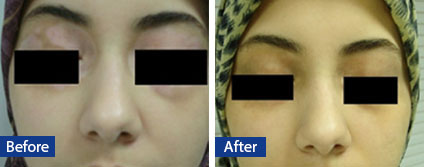

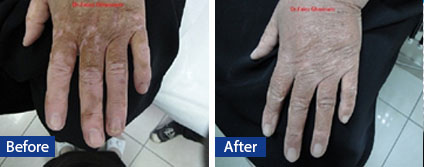
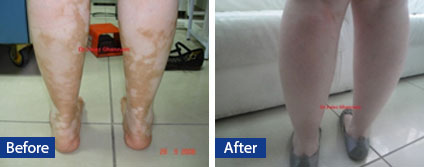
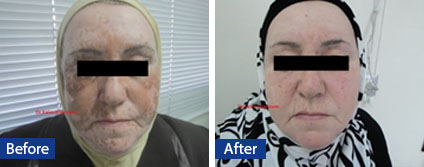
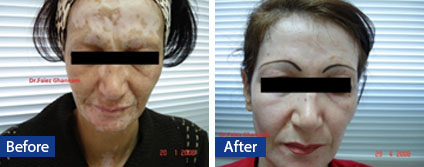
PSORIASIS
Psoriasis: What Is It?
Psoriasis is a skin condition that causes red, flaky, crusty patches of skin covered with silvery scales. These patches normally appear on your elbows, knees, scalp and lower back, but can appear anywhere on your body. Most people are only affected with small patches. In some cases, the patches can be itchy or sore.
What Causes Psoriasis?
Common psoriasis causes include: Infections, such as strep throat or skin infections, weather - especially cold, dry conditions, injury to the skin, such as a cut or scrape, a bug bite, or a severe sunburn.
Can Psoriasis be Treated?
Specialists at SAC addresses the problem with the aim to stop skin cells from growing so quickly and to remove scales. Options include creams and ointments (topical therapy), light therapy (phototherapy), and oral or injected medication.
Which treatments the Doctor will use depends on how severe the psoriasis is and how responsive it has been to previous treatment.
Subscribe to our Newsletters
Enter Your E-mail Address to Receive Our Latest News